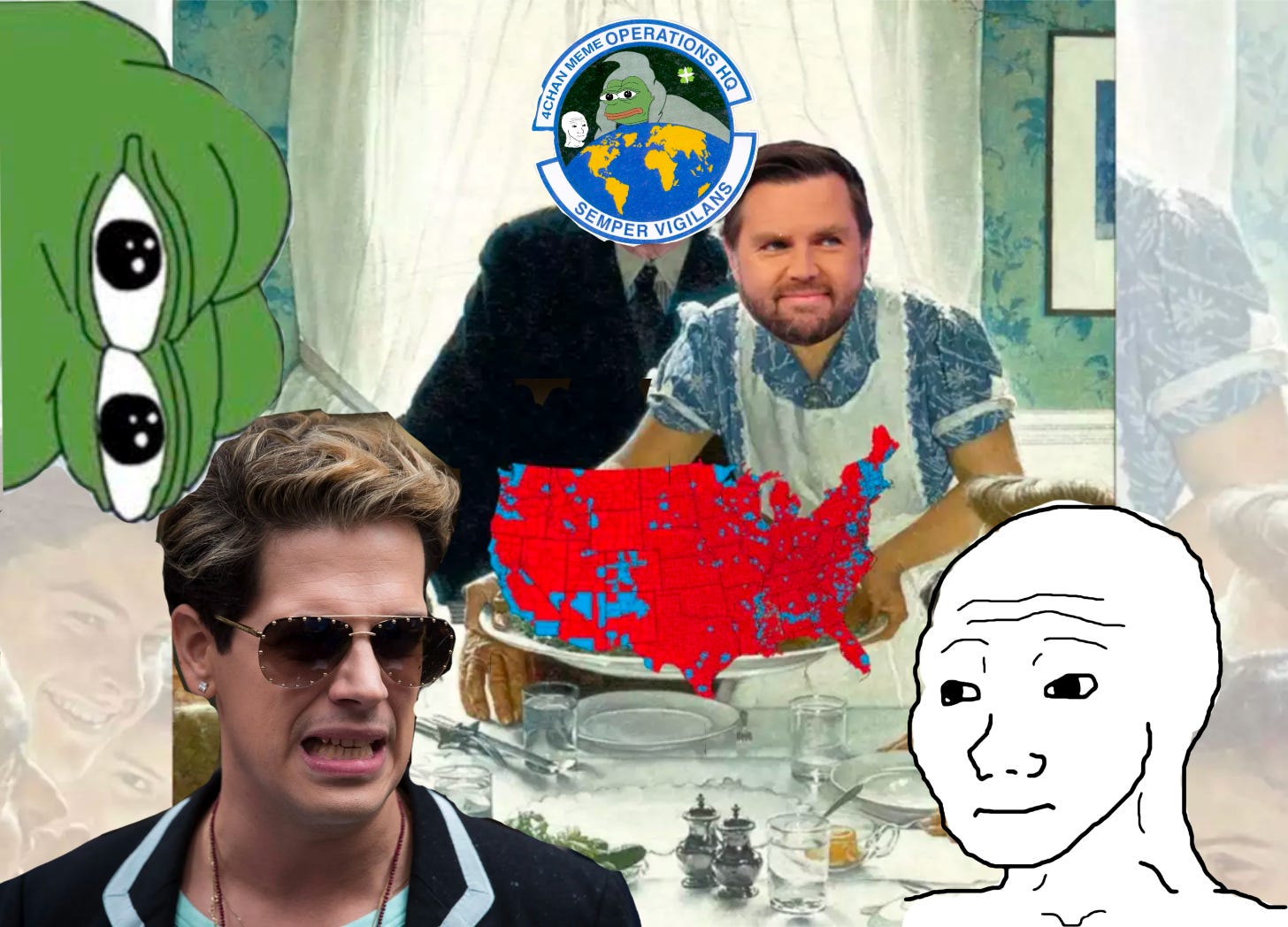BONUS: Contemporary Politics Are Shaped by GamerGate
I know because I was there for it
If you may, a brief diversion. This veers away from my professional background as a utility energy analyst to my personal background as someone who spent his adolescence “extremely online.” But I still find this account relevant, because the political language and aesthetics of GamerGate still drive the souls of your entry-level staff and the political currents that will shape energy policy for the next ten years.
In high school, I was too gifted for my own good. I distinctly remember open-scrolling Reddit in my Pre-Calculus class, immune from consequence because I already had done my homework for the day in class. I was mostly a lurker, but I remember being warned away from a website called 4chan—particularly some /b/ forum. I took the advice and didn’t ask any questions.
In hindsight, this feels quaint. Nowadays, the language of /b/, a twisted spin-off of SomethingAwful’s “F— You and Die” forum, is the background noise of X, née Twitter. Recent posts about the “Soy Right” and its role in the second Trump Administration dredged up my memories of this depraved meme nexus that broke containment in 2014.
Everyone who talks about GamerGate seems compelled to downplay its importance simply because its core figures were clowns. But it was important when its tactics got Donald J. Trump elected the first time, and it’s even more important today, because people who would cite GamerGate as their political awakening now staff every Republican institution at the fellow, analyst, and program manager level.
A Brief History of GamerGate
Ian Danskin provides an hour-long play-by-play. Angela Nagle provides a book-length play-by-play. CJ the X can tell you what it felt like. And if you want a right-leaning perspective, Carl Benjamin was there for it.
I’ll give you a summary.
GamerGate was, to some extent, the Crimean War of the internet. It was the means-testing for coordinated harassment campaigns,1 the weaponization of moderation tools, the use of bot accounts, the strategic ambiguity of political “jokes,” the tactics for overwhelming establishment institutions through sheer speed and throughput, and half of the political language of the current age:
based, -pilled, -maxxing, anon, fren, Chad, kek, normie, soy, NPC, cope, seethe, mald, lurker, doomer, incel, simp, cringe, bugman, glowie, wojak, alpha, beta, sigma
That all started with GamerGate, with 4chan, with /b/. It started with a toxic romance, escalated into a harassment campaign, widened into an assault on “woke” internet culture websites, and became the massing of fires behind an “alt-right.” This cohort of people is the reason Donald Trump won the Republican primary in 2016.2 Everyone else in the GOP fell in line afterward because none of them knew what was going on. Neither did anyone in the pro-Trump coalition either—at the time.
The only functional opposition to the GamerGaters were what we would now call the “woke” left. Whereas GamerGate pulled its language and norms from 4chan by way of SomethingAwful, this activist left pulled its language and norms from Tumblr by way of abstruse feminist and leftist literature. This is the source of the other half of contemporary political language:
intersectional, privilege, trigger warning, problematic, safe space, TERF, ally, cisgender,3 greenwashing, pinkwashing, climate crisis, microaggression, deadname, The Discourse™️, callout, cancel, receipts, folx, Latinx, neurodivergent
That was ten years ago now. Mind the timelines—if the original mass for GamerGate were between 15 and 30 in late 2014, they’re between 25 and 40 now.
And as of early 2025:
Luigi Mangione is 26.
Kyle Rittenhouse is 32.
Palmer Luckey is 32. He has one kid.
Alexandria Ocasio-Cortez is 35.
Paul Dochney—@dril—is 35.
Grimes is 36. She has three kids.
Vivek Ramaswamy is 39. He has two kids.
Sam Altman is 39. He has one kid.
JD Vance is 40. He has three kids.
All of these people could tell you where they were in 2014. All of them would understand the sentence, “DOGE may be staffed by irony-poisoned channers who think foreign aid is for cucks, but their posts are still bait.”
GamerGate Politics
In my recent post about the Mr. Beast Memo, I wrote:
The modal Zoomer had their innocence sandblasted out of their eyeballs by their phones as adolescents. We have seen limited proof of competent authority. Formality is dead. Casual, direct speech is the new signal for trustworthiness…Gen Z, at the zeitgeist level, associates decorum and propriety with unwillingness to call a spade a spade.
This, more than any particular doctrine, describes the vibe in upstart institutions like DOGE and in rejections of established institutions like NATO.4 Young posters and lurkers found their political awakenings in GamerGate, in realizing that they didn’t like how video game reviewers talked about them. They poked more, and they realized they didn’t like how news publications talked about them, or how the Democratic Party talked about them, or what their job prospects looked like, or what their dating pool looked like. They poked more, and they realized they were hemmed in by a labyrinth of Chesterton’s Fences, and they started asking what federal technocrats did all day, and what the United States gets out of NATO, and hey, why not take a sledgehammer to the entire executive branch?
At oldest, a GamerGater started their adulthood in the immediate aftermath of the Great Recession, watching social media unravel their society as they tried to start their careers. At youngest, they don’t remember 9/11. The Cold War is history. Vietnam is a playlist. The optimism of the ‘90s, the rebellions of Gen X, the “Morning in America,” the gray flannel suits, they're all myths now. The GamerGaters see little value in standing athwart history, yelling Stop, because they believe they missed the part of history worth stopping on. The video games were better back then, but they’re not coming back.
The Trumpian ideology is still coalescing. There’s still time to shape its priorities.5 But its emotional and aesthetic core started on 4chan. It started with GamerGate.
From Tumblr to Gaza to Fifth Column
I wasn’t a GamerGater back then—I fell in with the “woke” side, because they made better YouTube videos. But this cohort has also aged into the 25-40 bracket. They're getting Ph.Ds, buying Porsches, and becoming political operatives. They’re less politically relevant in part because they lost to the GamerGaters in both 2016 and 2024, but they really lost power in 2023.6
Even before the October 7th attack in Israel, the anti-GamerGate cohort had an “America Bad” streak coming from a deep library of leftist writers who framed the United States (and the Bretton Woods order it enforced) as fundamentally villainous.7 While GamerGate raged, their opponents were also protesting the Keystone XL pipeline, the police killings of myriad Black people, and miscellaneous LGBT causes. In hindsight, they (we) were just as culturally marginal, internet-poisoned, and politically unpopular as the GamerGaters. But whereas the GamerGaters could co-opt the Republican Party to their own ends (at least after ten years), the “woke” left simply joined the Democratic Party. The leadership neither took up the online left’s banner nor fully rejected it.8
The most recent war in Gaza forced a split. People with language pulled from 2014 Tumblr, already primed to see the United States as a malevolent imperial hegemon, saw Washington’s institutional ambivalence towards Israel’s military operation as a final betrayal. They will never forgive the United States institutional establishment for standing by the Israeli government. Even as they post in horror about whatever damage the Trump 2.0 cohort does, they too are rooting for collapse. They responded to the threatened TikTok ban by seeking out another Chinese social platform. That’s fifth column behavior.
Whereas the GamerGate cohort now has access to the White House, the internet leftists who opposed them are in the political wilderness. But they’re also aging, advancing their careers, buying houses, and having children. They will come back, and unlike the GamerGaters, they don’t believe they missed the part of history worth stopping on. They believe the American Dream was poisoned from the start.
“Woke” ideology won’t stay dead forever. It’ll be back by 2030. But its language and internal mythology came from Tumblr. It will always remember GamerGate.
This is Politics Now
Remember, I’m in my late 20s. I was online for GamerGate. These are my people. And all this history is important, because American policy for the next ten years—including the energy policy that directly affects electric utilities—will be driven by people who were 15ish to 30ish for GamerGate and now will wash through middle age into increasing echelons of political, managerial, cultural, and financial leadership. They will continue to adapt 2010s memes into contemporary political parlance, and they will continue to question the institutional, geopolitical, and journalistic norms that people took for granted in the immediate aftermath of the Cold War.
History books will treat Zoë Quinn, Davis Aurini, Anita Sarkeesian, Daryush Valizadeh, Brianna Wu, Milo Yiannopoulous, and so on like so many footnotes in a conflict that spun far beyond them. But this back-and-forth remains a generational point of reference. One can draw a straight line from “ethics in games journalism” to Pepe the Frog to the “okay” 👌 emoji to Elon carrying a sink into Twitter headquarters.9
People who were teenagers for Gamergate are now staffers for major politicians.
People who spent their twenties on Tumblr or Reddit or 4chan have children now.
The Vice President of the United States of America is now a reply guy.
Feels bad, man.
“Cancelling,” euphemistically
That, and the consensus analysis that Trump was a top-tier poster.
The term was coined by a transgender microbiologist (among other pursuits), after cis and trans bonds in fat molecules.
My conversion away from this political cohort started in 2021 for personal reasons and solidified in 2022 with the Ukraine War.
Most famously, Noam Chomsky
The reason is that the Republican and Democratic Parties are structured differently. Jo Freeman explains this for Santi Ruiz:






really been enjoying your articles since I'm in the same age group and in the same industry.
personally I was on the other end of the gamer gate side, I would call it the spawning ground for the generation of online politics. It's definitely correct to say the right side is the closest to manifesting online memetics into actual political power.
But you also see the same division lines over the continued support for Israel and the constant give aways to corporate and boomer interest as areas where the online right still doesn't pull the actual levers of power.
I do have to wonder how quickly things may change when the boomer dam breaks and we no longer have a gerontocratic political class.
I was on 4chan for almost a decade and now I think Pete Buttigieg is pretty cool. I have a good friend who could give you an extemporaneous minute-by-minute account of the USS Liberty incident from his pol days and he voted for Elizabeth Warren in 2024. MattY started Vox but now he talks about how fracking is good.
Without denying Trumps electoral success, I posit a large (preponderant?) group of people who grew up on radical internet politics and then just moderated when they got older.